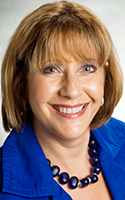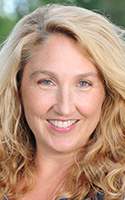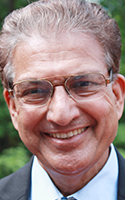Practitioners say more in the medical industry accepting the benefits of what they call ‘integrative medicine’
By Deborah Jeanne Sergeant
In recent years, complementary medicine and holistic health care services have grown in popularity and availability. Most insurers cover at least some modalities. According to the National Institutes of Health, more than 30 percent of adults and approximately 12 percent of children use non-Western health care.
A few prestigious medical schools have begun offering dual certification programs, which has raised the esteem for integrative practitioners. Well-known medical doctors such as Mehmet Oz, Deepak Chopra, Andrew Weil, and Mark Hyman also use and endorse modalities that originate outside Western medicine.
Physician Az Tahir practices holistic integrative medicine at High Point Wellness in Syracuse. In addition to his training as a medical doctor and post-graduate studies that specialized in several areas, he is a licensed massage therapist and has completed training in several types of massage, clinical hypnotherapy and homeopathy.
“It has been a slow journey to be accepted,” Tahir said. “Many doctors are seeing the benefits of holistic health and complementary medicine.”
He said that among those who aren’t embracing complementary medicine are doctors who don’t see the connection between lifestyle and health. He recalled a patient he knows who was given a hamburger after colon cancer surgery, even though red meat has been identified as a contributory cause of colon cancer.
Tahir said that medical schools provide students with little education about nutrition and the benefits of modalities such as relaxation, aromatherapy and other basics of complementary medicine.
According to the National Institutes of Health, more than 30 percent of adults and approximately 12 percent of children use non-Western health care.
“It’s unfair the patients don’t get the benefit of complementary medicine,” Tahir said. “With treating cancer, some of my colleagues are doing a good job in providing all the options and others are just saying, ‘Surgery, chemotherapy and radiation are the only options.’”
Tahir hopes that patients continue to push for more approval of complementary medicine so that it will become more accepted.
Laurel Sterling, natural health educator and registered dietitian practicing in Canastota, believes that complementary medicine has become more accepted in the 17 years she’s worked in the industry.
“Using fish oil as a supplement is more accepted and doctors are recommending probiotics,” she said as just two examples.
She said that many nurse practitioners she knows attend integrative health conferences to meet patient demand as patients become more savvy about their own health.
Sterling thinks that since insurance drives a lot of the health care industry, broadening insurance to accept more complementary health will help increase the accessibility to complementary health.
“Some people want to take measures to go in a more natural way to help heal their bodies instead of the Band-Aid approach, which what a lot of medications do,” Sterling said.
Wendy Meyerson, owner of Natur-Tyme in Syracuse, recalls when her father, Stan Meyerson, a local integrative pharmacist, hosted a radio show about health when she was a youngster. At first, many doctors doubted his approach was helpful. But eventually, many doctors called into his radio show to ask questions.
In this example and through others, Meyerson has observed firsthand the shift in patient trust from only conventional to more integrative medicine. She thinks that more people want to become proactive about their health because they discover it helps.
“People have found success in using diet, exercise, hands-on modalities and nutritional supplements,” she said.
While she said that patients must discuss scaling back or quitting medication with their doctor, healthful lifestyle habits can help them improve their health and possibly reduce or eliminate some medication.
She wants the area of non-pharmaceutical pain management to continue to develop, as well as prevention and management of chronic conditions such as high blood pressure and high blood sugar.
“People can’t afford to live with the medical system, whether drugs or physicians,” Meyerson said. “[Patients are] looking at other ways to do things that are more effective and economical.”


 Experts we spoke with, from left, are physician Az Tahir, High Point Wellness in Syracuse; Laurel Sterling, natural health educator and registered dietitian practicing in Canastota; Wendy Meyerson, owner of Natur-Tyme in Syracuse.
Experts we spoke with, from left, are physician Az Tahir, High Point Wellness in Syracuse; Laurel Sterling, natural health educator and registered dietitian practicing in Canastota; Wendy Meyerson, owner of Natur-Tyme in Syracuse.

